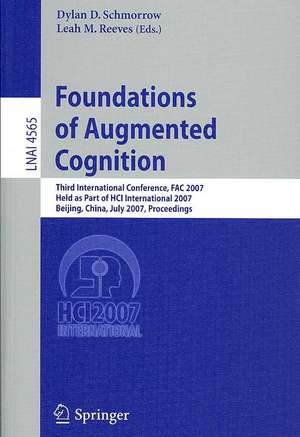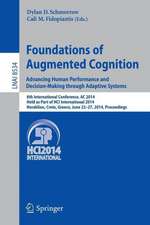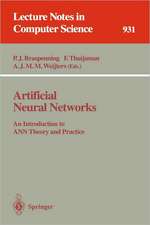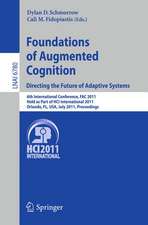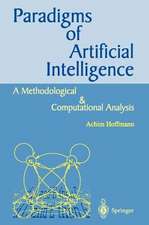Foundations of Augmented Cognition: Third International Conference, FAC 2007, Held as Part of HCI International 2007, Beijing, China, July 22-27, 2007, Proceedings: Lecture Notes in Computer Science, cartea 4565
Editat de Dylan D. Schmorrow, Leah M. Reevesen Limba Engleză Paperback – 29 iun 2007
Din seria Lecture Notes in Computer Science
- 20%
 Preț: 1061.55 lei
Preț: 1061.55 lei - 20%
 Preț: 307.71 lei
Preț: 307.71 lei - 20%
 Preț: 438.69 lei
Preț: 438.69 lei - 20%
 Preț: 579.30 lei
Preț: 579.30 lei -
 Preț: 410.88 lei
Preț: 410.88 lei - 17%
 Preț: 427.22 lei
Preț: 427.22 lei - 20%
 Preț: 596.46 lei
Preț: 596.46 lei - 15%
 Preț: 448.04 lei
Preț: 448.04 lei - 20%
 Preț: 353.50 lei
Preț: 353.50 lei -
 Preț: 389.49 lei
Preț: 389.49 lei - 20%
 Preț: 309.90 lei
Preț: 309.90 lei - 20%
 Preț: 645.28 lei
Preț: 645.28 lei - 20%
 Preț: 763.23 lei
Preț: 763.23 lei - 15%
 Preț: 580.46 lei
Preț: 580.46 lei - 20%
 Preț: 310.28 lei
Preț: 310.28 lei - 20%
 Preț: 655.02 lei
Preț: 655.02 lei - 20%
 Preț: 1183.14 lei
Preț: 1183.14 lei - 20%
 Preț: 340.32 lei
Preț: 340.32 lei -
 Preț: 449.57 lei
Preț: 449.57 lei - 20%
 Preț: 591.51 lei
Preț: 591.51 lei - 18%
 Preț: 938.83 lei
Preț: 938.83 lei - 20%
 Preț: 337.00 lei
Preț: 337.00 lei - 20%
 Preț: 649.50 lei
Preț: 649.50 lei - 20%
 Preț: 607.40 lei
Preț: 607.40 lei - 20%
 Preț: 1414.79 lei
Preț: 1414.79 lei - 20%
 Preț: 1024.44 lei
Preț: 1024.44 lei - 20%
 Preț: 583.40 lei
Preț: 583.40 lei - 20%
 Preț: 453.32 lei
Preț: 453.32 lei - 20%
 Preț: 575.49 lei
Preț: 575.49 lei - 20%
 Preț: 1075.26 lei
Preț: 1075.26 lei - 20%
 Preț: 585.88 lei
Preț: 585.88 lei - 20%
 Preț: 825.93 lei
Preț: 825.93 lei - 17%
 Preț: 360.20 lei
Preț: 360.20 lei - 20%
 Preț: 763.23 lei
Preț: 763.23 lei - 20%
 Preț: 340.32 lei
Preț: 340.32 lei - 20%
 Preț: 504.58 lei
Preț: 504.58 lei - 20%
 Preț: 369.13 lei
Preț: 369.13 lei - 20%
 Preț: 580.93 lei
Preț: 580.93 lei - 20%
 Preț: 343.62 lei
Preț: 343.62 lei - 20%
 Preț: 350.21 lei
Preț: 350.21 lei - 20%
 Preț: 583.40 lei
Preț: 583.40 lei - 20%
 Preț: 583.40 lei
Preț: 583.40 lei - 15%
 Preț: 438.59 lei
Preț: 438.59 lei - 20%
 Preț: 341.95 lei
Preț: 341.95 lei - 20%
 Preț: 238.01 lei
Preț: 238.01 lei - 20%
 Preț: 538.30 lei
Preț: 538.30 lei
Preț: 341.30 lei
Preț vechi: 426.63 lei
-20% Nou
Puncte Express: 512
Preț estimativ în valută:
65.32€ • 70.51$ • 54.77£
65.32€ • 70.51$ • 54.77£
Carte tipărită la comandă
Livrare economică 19 aprilie-03 mai
Preluare comenzi: 021 569.72.76
Specificații
ISBN-13: 9783540732150
ISBN-10: 3540732152
Pagini: 471
Ilustrații: XIX, 452 p.
Dimensiuni: 155 x 235 x 29 mm
Greutate: 0.66 kg
Ediția:2007
Editura: Springer Berlin, Heidelberg
Colecția Springer
Seriile Lecture Notes in Computer Science, Lecture Notes in Artificial Intelligence
Locul publicării:Berlin, Heidelberg, Germany
ISBN-10: 3540732152
Pagini: 471
Ilustrații: XIX, 452 p.
Dimensiuni: 155 x 235 x 29 mm
Greutate: 0.66 kg
Ediția:2007
Editura: Springer Berlin, Heidelberg
Colecția Springer
Seriile Lecture Notes in Computer Science, Lecture Notes in Artificial Intelligence
Locul publicării:Berlin, Heidelberg, Germany
Public țintă
ResearchCuprins
I: Augmented Cognition Methods and Techniques.- Development of Gauges for the QinetiQ Cognition Monitor.- Quantitative EEG Changes Under Continuous Wakefulness and with Fatigue Countermeasures: Implications for Sustaining Aviator Performance.- Exploring Calibration Techniques for Functional Near-Infrared Imaging (fNIR) Controlled Brain-Computer Interfaces.- A Sensor Positioning System for Functional Near-Infrared Neuroimaging.- Ad-Hoc Wireless Body Area Network for Augmented Cognition Sensors.- Integrating Innovative Neuro-educational Technologies (I-Net) into K-12 Science Classrooms.- The Impact of Direct Data Entry by Sensory Devices on EMR Systems.- Event-Related Brain Dynamics in Continuous Sustained-Attention Tasks.- Information Filtering, Expertise and Cognitive Load.- Using Eye Blinks as a Tool for Augmented Cognition.- Assessing Information Presentation Preferences with Eye Movements.- Inclusive Design for Brain Body Interfaces.- A Human Computer Interface Using SSVEP-Based BCITechnology.- Enhanced P300-Based Cursor Movement Control.- Low Power Technology for Wearable Cognition Systems.- Novel Hybrid Bioelectrodes for Ambulatory Zero-Prep EEG Measurements Using Multi-channel Wireless EEG System.- Measuring Cognitive Task Load on a Naval Ship: Implications of a Real World Environment.- Measuring Spatial Factors in Comparative Judgments About Large Numerosities.- Augmented Metacognition Addressing Dynamic Allocation of Tasks Requiring Visual Attention.- Highly Configurable Software Architecture Framework for Acquisition and Visualization of Biometric Data.- Simulation Fidelity Design Informed by Physiologically-Based Measurement Tools.- Reverse Engineering the Visual System Via Genetic Programs.- EEG-Based Estimation of Mental Fatigue: Convergent Evidence for a Three-State Model.- Augmenting Task-Centered Design with Operator State Assessment Technologies.- Augmented Cognition and Cognitive State Assessment Technology – Near-Term, Mid-Term, and Long-Term Research Objectives.- II: Applications of Augmented Cognition.- Augmented Cognition, Universal Access and Social Intelligence in the Information Society.- Intent Driven Interfaces to Ubiquitous Computers.- Foundations for Creating a Distributed Adaptive User Interface.- EMMA: An Adaptive Display for Virtual Therapy.- Closed-Loop Adaptive Decision Support Based on Automated Trust Assessment.- A Closed-Loop Adaptive System for Command and Control.- Attuning In-Car User Interfaces to the Momentary Cognitive Load.- EEG-Based Drivers’ Drowsiness Monitoring Using a Hierarchical Gaussian Mixture Model.- The Effect of Fatigue on Cognitive and Psychomotor Skills of Surgical Residents.- Assessing the Real-Time Cognitive Capabilities of First Responders Using Emerging Technologies in Manikin Simulators.- Physiologic System Interfaces Using fNIR with Tactile Feedback for Improving Operator Effectiveness.- A Model for Visio-Haptic Attention for Efficient Resource Allocation in Multimodal Environments.-Towards Attention-Guided Human-Computer Collaborative Reasoning for Spatial Configuration and Design.- Automated SAF Adaptation Tool (ASAT).- Unobtrusive Multimodal Emotion Detection in Adaptive Interfaces: Speech and Facial Expressions.- Embedding Hercule Poirot in Networks: Addressing Inefficiencies in Digital Forensic Investigations.- The Future of Augmented Cognition Systems in Education and Training.- An Adaptive Instructional Architecture for Training and Education.- AFFectIX – An Affective Component as Part of an E-Learning-System.- Performance Compared to Experience Level in a Virtual Reality Surgical Skills Trainer.- Exploring Neural Trajectories of Scientific Problem Solving Skill Acquisition.- Towards a Closed-Loop Training System: Using a Physiological-Based Diagnosis of the Trainee’s State to Drive Feedback Delivery Choices.- Aiding Tomorrow’s Augmented Cognition Researchers Through Modeling and Simulation Curricula.- Designing for Augmented Cognition – Problem Solving for Complex Environments.- Making the Giant Leap with Augmented Cognition Technologies: What Will Be the First “Killer App”?.- Augmenting Cognition: Reviewing the Symbiotic Relation Between Man and Machine.
